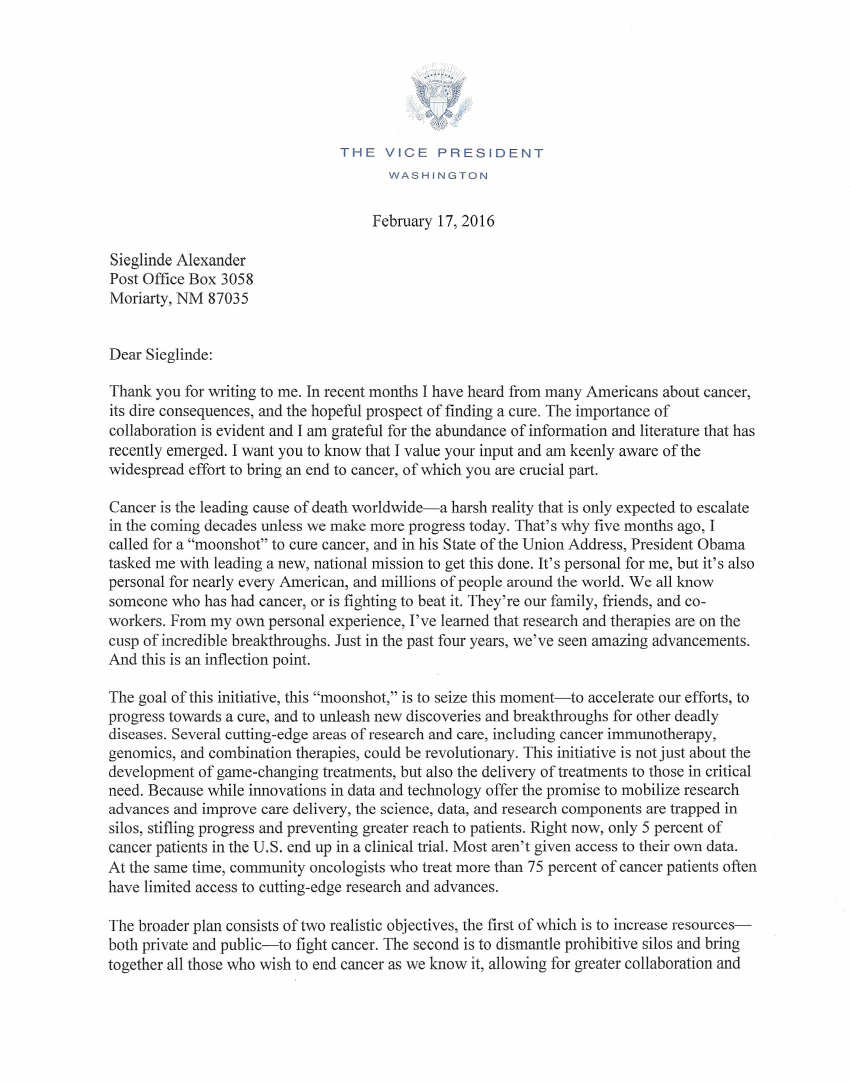- Eine Webseite von Sieglinde W. Alexander
Brief von Joe Biden
Dear Sieglinde:
Thank you for writing to me. In recent months I have heard from many Americans about cancer, its dire consequences, and the hopeful prospect of finding a cure. The importance of collaboration is evident and I am grateful for the abundance of information and literature that has recently emerged. I want you to know that I value your input and am keenly aware of the widespread effort to bring an end to cancer, of which you are crucial part.
Cancer is the leading cause of death worldwide-a harsh reality that is only expected to escalate in the coming decades unless we make more progress today. That’s why five months ago, I called for a “moonshot” to cure cancer, and in his State of the Union Address, President Obama tasked me with leading a new, national mission to get this done. It’s personal for me, but it’s also personal for nearly every American, and millions of people around the world. We all know someone who has had cancer, or is fighting to beat it. They’re our family, friends, and coworkers. From my own personal experience, I’ve learned that research and therapies are on the cusp of incredible breakthroughs. Just in the past four years, we’ve seen amazing advancements. And this is an inflection point.
The goal of this initiative, this “moonshot,” is to seize this moment-to accelerate our efforts, to progress towards a cure, and to unleash new discoveries and breakthroughs for other deadly diseases. Several cutting-edge areas of research and care, including cancer immunotherapy, genomics, and combination therapies, could be revolutionary. This initiative is not just about the development of game-changing treatments, but also the delivery of treatments to those in critical need. Because while innovations in data and technology offer the promise to mobilize research advances and improve care delivery, the science, data, and research components are trapped in silos, stifling progress and preventing greater reach to patients. Right now, only 5 percent of cancer patients in the U.S. end up in a clinical trial. Most aren’t given access to their own data. At the same time, community oncologists who treat more than 75 percent of cancer patients often have limited access to cutting-edge research and advances.
The broader plan consists of two realistic objectives, the first of which is to increase resourcesboth private and public-to fight cancer. The second is to dismantle prohibitive silos and bring together all those who wish to end cancer as we know it, allowing for greater collaboration and information sharing. I am confident that successful execution ofthese objectives will double the rate of progress and yield a decade’s worth of advances in just five years.
Over the next year, I will lead a combined effort by governments, private industry, researchers, physicians, patients, and philanthropies to ensure tactful investment and increase access to information for all involved stakeholders. Through increased funding, targeted incentives, and greater private-sector coordination, we can enable progress in a truly meaningful way. We’ll promote unprecedented levels of cooperation among leading cancer centers and further encourage data and technology innovators to playa role in revolutionizing how research and medical data is shared to reach new breakthroughs. Moreover, we will assist the oncology community in improving communication with doctors across the United States and around the world, so the same care can be provided to all patients in critical need. Finally, we will ensure that the patient community is heard, so that patients and their families are treated as partners in care and are given access to their own data and the opportunity to contribute to research.
Fifty-five years ago, President Kennedy stood before ajoint session of Congress and urged support for an achievable, albeit extraordinary and ambitious goal. This great national effort, to put a man on the moon, required a collaborative endurance the likes of which had not previously been imagined. It inspired a generation of Americans-my generation-to pursue progress in science and innovation, and literally push the boundaries of what was possible.
This is our moonshot. I know that we can help solidify a genuine global commitment to end cancer as we know it today, inspire a new generation of scientists to pursue new discoveries, and eclipse the bounds of human endeavor. That is the history ofthe journey ofthis country. If there’s one word that defines who we are as Americans, it’s “possibility.” These are the moments when we show up.
Thanks again for writing, and for the work you’re doing on behalf of future generations.
Sincerely,
Joseph R. Biden, Jr.

